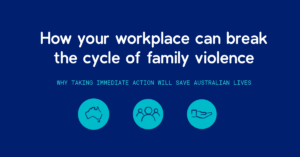Changing the Cycle of Family Violence

Workplace strategies that you can implement today
Renae Lowry, Executive General Manager, MatchWorks
As the third and final article in our series on family and domestic violence in Australia, this piece is focused on action. I’ll take you through tangible strategies that have the power to change the trajectory of this issue. And, while I know that the statistics I spoke about in article one can make the issue seem insurmountable, I also know that your contribution matters. KPMG reported that even a 5% reduction in family violence will prevent 6,000 new cases. That kind of change means that lives will be saved and it can also save $333 million in productivity costs over time (2016).
Why is the workplace so important?
Work is a physical place that’s recognised to improve outcomes for people affected by family and domestic violence. Why? Let’s begin with the UN, who says that economic empowerment is certainly part of the solution (Dalal 2011), but it’s just one part of the story. Education, modified cultural norms, supportive workplace policies, and gender equality all play their part. We also know that work gives people self-esteem, self-confidence, and a sense of belonging.
Abby Newman, Family Violence Expert, says that there isn’t a white knight solution where we ride in and save people; however, from a place of understanding, there are practical ways in which a workplace can break the cycle of family violence, help more people to leave a violent situation, and help people to survive.
“Workplaces are often a safe place for people but we need to remember that family violence will still follow them, that we’re connected by phones, we’re connected by text messages, we’re connected by people showing up at workplaces” (Newman 2019).
Let’s talk strategies
Your workplace can be a concentrated centre for change and even simple shifts in regards to acceptable language can make all the difference. This is where you become a catalyst for transformation.
1. The power of policy
When your workplace has clear policies in regards to family violence support, it can create a culture of intolerance. Here are some things you can champion in your workplace today:
- The provision of flexible work arrangements
- The development of clear policies and procedures around family violence
- Awareness training for all managers and education programs for staff
- Free access to counsellors to provide specialised support
- Flyers about where to access support to be placed on the back of toilet doors.
2. Education and training
There are some fantastic resources available to empower your staff/colleagues to effectively manage family violence issues. Our white paper includes an appendix of resources that can get you started. You can also share videos around control such as Love Control.
3. The impact of gender inequality
Gender inequality can be expressed as unequal pay, sexual harassment, relationship status discrimination, and diminished responsibilities. Watch and share this short film on the effects of gender inequality, Being a Man in the Workplace, and read the genU fact sheet ‘Gender Inequality in the Workplace’, found in our full white paper. These resources will help you to see the impact of gender inequality because we know that rigid ideas about gender roles can drive family violence.
4. Don’t forget to check in
There’s power in support and looking out for others. If you suspect a co-worker is experiencing violence, ask them: “Are you safe at home?” Some people may not feel comfortable disclosing information; however, Newman says that you can say: “I understand family violence, I respect your safety, and I also respect your ability to make decisions.”
5. Take their word for it
When someone opens up about their experience with family violence, it’s important to accept it. It can be an incredibly tough and emotional experience finally opening up to another person and it’s important that they’re not dismissed in any way.
Most people don’t want someone to take over and fix the situation for them. They want to be empowered and the best thing you can do is link them to the right services. Having said that, sometimes the safety of the person trumps their desire to keep the violence hidden so you may need specialist family violence services to get them the support they need.
6. Support through relocation
If your organisation has operations in other states, you can make staff aware that moving to other locations is a possibility. This could help them see a pathway to physical safety.
7. Acknowledging your commitment
Including days in your workplace calendar – such as International Day for the Elimination of Violence Against Women and the United Nation’s Human Rights Day – highlights your organisation’s commitment to ending all forms of family violence.
Will you commit to change?
You’ll always be defined by the worst possible behaviour you accept. As discussed earlier, small actions, such as not accepting gender inequality in your workplace, can create the space for change. The strategies I have outlined above can change the trajectory of this issue. So now the question is, will you commit to change?
Before I end there, I also want to touch on the importance of sharing stories. Because, when you give voice to a voiceless situation, others can gain hope. There’s power in speaking up and sharing a focus on issues that matter.
These three articles – covering the need for change, the intersections of violence, and workplace strategies – can be that voice. It’s my hope that you read them, connect with the words, and share them with your own networks so that we can fuel a conversion around change. Change that can come from you and your workplace.
- Article one: Family Violence in Australia Needs Your Attention
- Article two: Family Violence Doesn’t Discriminate, it Intersects
- Article three: Changing the Cycle of Family Violence

References
Dalal, K 2011, Does economic empowerment protect women from intimate partner violence? J Inj Violence Res. Jan; 3(1): 35-44, doi: 10.5249/jivr. v3i1.76.
KPMG Australia 2016, The Cost of Violence Against Women and Their Children in Australia. Report prepared for the Department of Social Services. Australia.
MatchWorks 2019, How your workplace can break the cycle of family violence: why taking immediate action will save Australian lives, MatchWorks, Victoria.
Newman, A 2019, Interview with Sophy Chirnside from MatchWorks, 2 August